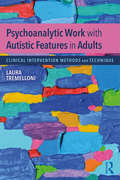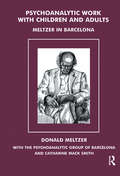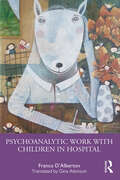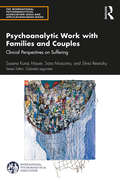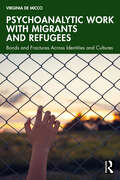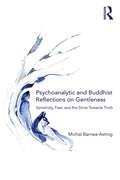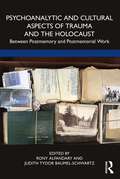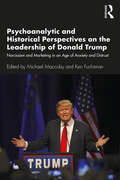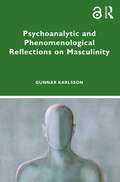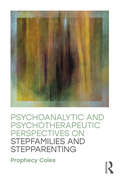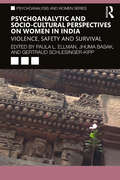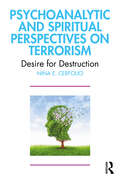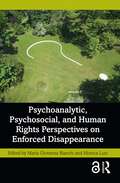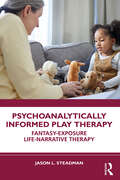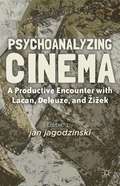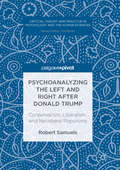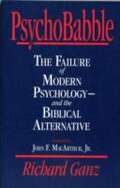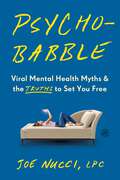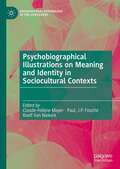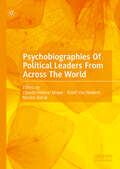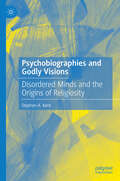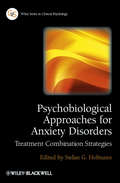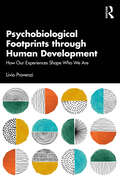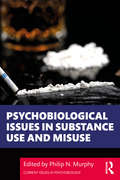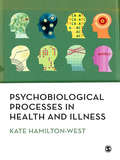- Table View
- List View
Psychoanalytic Work with Autistic Features in Adults: Clinical Intervention Methods and Technique
by Laura TremelloniPsychoanalytic Work with Autistic Features in Adults deals with the diagnostic and therapeutic difficulties of working with patients with autistic residuals, formed in early life experiences that have remained dormant in the unconscious mind. Laura Tremelloni traces the process of identifying them in adult patients, and stresses the need to develop a treatment plan suitable for this kind of pathology. This book uses clinical cases to examine the difficulties of work with hard to reach adults with 'gaps' in their sense of Self and symptoms related to primitive experiences of "non-being". Tremelloni presents new, adaptive therapeutic intervention methods for overcoming such obstacles and identifies the personification and permanence of undeveloped parts of the Self, in hard to reach adults who have otherwise developed satisfactorily and would not be diagnosed as autistic. In such cases, the author suggests the need for clinicians to adapt classic psychoanalytic approaches to the alternating levels of development of the separate parts which the Self has broken into. Psychoanalytic Work with Autistic Features in Adults will help clinicians in psychoanalysis and psychoanalytic psychotherapy to more effectively reach such patients, whilst attempting to address the problematic limitations of therapeutic techniques in very difficult clinical cases.
Psychoanalytic Work with Children and Adults: Meltzer in Barcelona
by Donald MeltzerThis volume is a collection of seminars and lectures the author gave to the Psychoanalytic Group of Barcelona under Dr Leon Grinberg, and later Dr Benito Lopez, during his visit to Barcelona. The clinical case studies outlined in the book address with typical variety the author's thoughts on clinical work with children and adults, and the numerous issues involved therein, including depression, jealousy, delusional omnipotence and perversion.
Psychoanalytic Work with Children in Hospital
by Franco D'AlbertonPsychoanalytic Work with Children in Hospital presents the experiences of a psychoanalyst working within a hospital paediatric department. It explores the possibilities for applying psychoanalytic theory when working with children in hospital and how it can be extended to include parents, caregivers, health care staff and volunteers. Each chapter of the book addresses an issue or area of professional experience that presented Franco D’Alberton with clinical or technical questions, outlining the core concern and then exploring his attempt to provide answers to these questions. This volume presents many possible applications of psychoanalytic theory in a paediatric hospital, encompassing issues encountered by health care staff and volunteers as well as by parents and their hospitalized children, such as physical pain, meetings and information sharing and group settings. It also describes therapeutic interventions directed towards both children and parents. This book will be key reading for child and adolescent psychoanalysts, psychotherapists, and clinical psychologists in practice and in training. It will also interest clinicians seeking to understand how psychoanalytic work can be applied in hospital and health care settings.
Psychoanalytic Work with Families and Couples: Clinical Perspectives on Suffering (The International Psychoanalytical Association Psychoanalytic Ideas and Applications Series)
by Susana Kuras Mauer Sara Moscona Silvia ResnizkyPsychoanalytic Work with Families and Couples rethinks the ways in which conflicts present today in psychoanalytic consulting rooms and the nature of suffering in family, couple, and sibling bonds. Based on two major concepts, that of device (drawn from the philosophers Foucault, Deleuze, and Agamben) and that of link (developed by Berenstein and Puget), the authors have developed new approaches to clinical practice with families and couples that focus on the complexity, singularity, and immanence of patient-analyst interaction in the session. In thinking about link dynamics, moreover, they go beyond the consulting room to reflect on how these dynamics develop in other spaces, such as institutions, organizations, and the fraternal circle of colleagues. Part I, Couples and Families Today, discusses changes undergone by families and couples in the last thirty years and their effects on psychoanalytic practice. Attributing a link logic to suffering and to the situations that condition it implies making significant decisions regarding our clinical strategy, our choice of a device and of an interpretive path. Faithful to the idea that the clinical dimension calls for transformations, the second part, Facing Clinical Challenges, includes clinical materials from manifold treatment devices that attest to changes both in contemporary paradigms and in the professional lives of psychoanalysts. Psychoanalytic Work with Families and Couples will be of great interest to all practicing psychoanalysts and psychoanalytic psychotherapists.
Psychoanalytic Work with Migrants and Refugees: Bonds and Fractures Across Identities and Cultures
by Virginia De MiccoPsychoanalytic Work with Migrants and Refugees presents a rich panorama of the clinical issues facing those who experience migration. Thorough and empathetic in its approach, this book considers the potentially devastating impact of migration on one’s sense of personal and cultural identity, using clinical vignettes from reception centres to illustrate the experience of both adult and adolescent migrants. Virginia De Micco looks at the transgenerational impact migration can have on psychic development and child-parent relationships, both on a socio-anthropological and an unconscious level. She highlights the unique migratory experience of both women and mothers, equipping readers with the tools to deal with the grief and guilt that can arise in these nuanced situations. Adopting an anthropological approach, De Micco also considers the irrevocable impact of migration on the host country, looking both at the reaction of those who live in the receiving countries as well as the broader impact of multiculturalism and globalisation. Throughout, the book offers a deep, fundamental understanding of the psychic conditions and reactions of people receiving migrants, with a view to avoiding cultural misunderstandings and bias and improving the integration process. This book is an essential manual for psychoanalysts and psychologists working with migrants and refugees, as well as social workers and care workers based in reception centres and other institutions dealing with migrants.
Psychoanalytic and Buddhist Reflections on Gentleness: Sensitivity, Fear and the Drive Towards Truth
by Michal Barnea-AstrogInspired by Buddhist teachings and psychoanalytic thought, this book explores gentleness as a way of being and a developmental achievement. It offers reflections on the unique position of "gentle people", as well as certain gentle layers of the psyche in general, as they meet the world. Examining the perceptual-sensory-conscious discrepancy that often exists between a gentle person and their surroundings, it follows the intricate relationship between sensitivity and fear, the need for self-holding, and the possibility of letting go. Incorporating theoretical investigation, clinical vignettes, and personal contemplation, the book looks into those states of mind and qualities of attention that may compose a favorable environment, internal and interpersonal, where gentleness can be delicately held. There, it is suggested, gentleness may gradually shed the fragility, confusion, and destructiveness that often get entangled with it, and serve as a valuable recourse. Offering a unique perspective on a topic rarely discussed, the book has broad appeal for both students and practitioners of psychoanalysis and psychotherapy, as well as Buddhist practitioners and scholars.
Psychoanalytic and Cultural Aspects of Trauma and the Holocaust: Between Postmemory and Postmemorial Work
by Rony Alfandary Judith Tydor Baumel-SchwartzPsychoanalytic and Cultural Aspects of Trauma and the Holocaust presents interdisciplinary postmemorial endeavors of second-, third- and fourth-generation Holocaust survivors living in Israel and in the Jewish diaspora. Drawing on a wide range of fields, including psychoanalysis, Holocaust studies, journal and memoir writing, hermeneutics, and the arts, this book considers how individuals dealing with the memory, or postmemory, of the Holocaust possess a personal connection to this trauma. Exploring their role as testimony bearers, each contributor performs their postmemorial work in a unique and creative way, blending the subjective and the objective. The book considers themes including postcolonialism, home, displacement, and identity. Psychoanalytic and Cultural Aspects of Trauma and the Holocaust will be key reading for academics and students of psychoanalytic studies, Holocaust studies, and trauma and cultural studies. It will also be of interest to psychoanalysts working with transgenerational trauma.
Psychoanalytic and Historical Perspectives on the Leadership of Donald Trump: Narcissism and Marketing in an Age of Anxiety and Distrust
by Michael MaccobyWhat is Donald Trump’s personality? Is he mentally ill? What in American culture and history enabled him to become president? How does his personality shape his policies and leadership? In this fascinating and highly relevant new book, these questions are answered by a selection of expert contributors, including psychoanalysts, historians, and a sociologist. Narcissism is defined and applied to Donald Trump, his personal history and style of leadership, and the relationship between Trump and his base is explored as a symptom of his needs and the needs of his followers. U.S. culture and U.S. politics are put under the lens, as chapters draw on contemporary academic and journalistic analysis, continuing discussions around gaslighting, demagoguery, and fascism in terms of their validity in application to Trump. Psychoanalytic and Historical Perspectives on the Leadership of Donald Trump refutes many of the mental health experts who label Trump as suffering from a narcissistic personality disorder and makes the case that Trump’s personality combines a marketing and narcissistic orientation that determines his behavior and policies. The authors also assert that to understand Trump’s rise and his followers, it is valuable to combine psychoanalytic, historical, and sociological perspectives. This book will therefore be of great interest to academics in those fields and all those with an interest in contemporary American politics.
Psychoanalytic and Phenomenological Reflections on Masculinity
by Gunnar KarlssonIn this highly original volume, Gunnar Karlsson offers new answers to the question concerning the relationship between belonging to a specific sex as a male and striving for a masculine identity. This book offers a uniquely psychoanalytic and phenomenological perspective on masculinity. Karlsson considers masculinity and traditional masculine ideals through a psychoanalytic lens before taking phenomenological concepts to chisel out the relationship between sex and gender. This perspective is developed throughout the volume to inspire readers to further their understanding of traditional gender assignment – female, male and intersex – in light of gendered characteristics such as femininity and masculinity. Chapters span topics such as the characteristics of typical, so-called “phallic masculinity”, its allure and psychogenetic explanation, as well as looking at what phallic masculinity disregards. Throughout, Karlsson maintains that phallic masculinity is unattainable, as it seeks to escape the existential conditions of helplessness, vulnerability, and dependence. He makes the case for the importance of considering the notion of ego-identity in the field of sex/gender studies, encouraging a liberation from gender stereotypes. Psychoanalytic and Phenomenological Reflections on Masculinity will be of great interest to researchers, clinical psychoanalysts and psychotherapists, as well as anyone interested in masculinity, gender studies and the relationship between sex and gender.
Psychoanalytic and Psychotherapeutic Perspectives on Stepfamilies and Stepparenting
by Prophecy ColesPsychoanalytic and Psychotherapeutic Perspectives on Step-families and Step-parenting looks at the role step-parents can play in the psychic development of children. Step-parenting requires enormous confidence and resilience that stretches into a territory of human emotions and conflict that can make marriage seem easy. Prophecy Coles’ concern has been that we are witnessing a new kinship system and our psychological thinking has not kept up with the emotional effect that stepparents are having upon the next generation. The author traces the history of our beliefs about stepparents through the oral tradition of the fairy story into our present, arguably prejudiced beliefs about them. Coles explores whether our feelings about stepparents arise from the unconscious tradition that placed stepparents in hostile opposition to the natural forces of parenting. The absence of detailed clinical work on the subject has meant that the author has drawn on interviews, biography and three long term research projects to think about this new family constellation. Covering such topics as the prevalence and importance of step-mothers historically, the reasons for psychoanalytic neglect of this subject, and using clinical material drawn from work with step-mothers, children and fathers, this is a much-needed guide to working with families affected by maternal loss and alternative parenting roles. It will encourage a further appreciation of the psychological difficulties that stepparents face, and at the same time offer a re-appraisal of the pain that young children go through when their parents decide to separate. Psychoanalytic and Psychotherapeutic Perspectives on Step-families and Step-parenting will appeal greatly to psychoanalysts and psychoanalytic psychotherapists.
Psychoanalytic and Socio-Cultural Perspectives on Women in India: Violence, Safety and Survival (Psychoanalysis and Women Series)
by Paula L. EllmanThis important book provides a bridge between psychoanalytic perspectives and socio-cultural issues to shine a spotlight on the experiences of women in India today. Women’s well-being and security has often depended upon their gender positioning while other binaries like rural-urban, class, and caste have also played a crucial role globally and especially in India. Historically, women have been subjected to various forms of oppression that include sex selective abortions, domestic violence, bride burning for dowry, and acid attacks. Threats to women’s security have recently increased with progressive polarization and hardening of socio-political and cultural ideologies. This book assesses how women’s lives are impacted by these social and cultural conventions and stigma, including ideas around motherhood, religion, intimacy and femininity itself, and the psychological implications these have. Topics include the seduction of religion, motherhood in contemporary times, intimacy and violence, and fundamentalist states of mind in the clinical space. While the book echoes a regional specificity, it simultaneously resonates a backdrop of global change of affairs that has its impact on ideological freedom and the concept of inclusivity in terms of gender, race, culture, and politics across the world. For this comprehensive perspective, the effort is to create a platform of authors comprising psychoanalysts, social scientists, scholars from the liberal arts discipline, as well as social activists. In a country where women have been historically subjected to both psychological and physical oppression, this timely and original book will interest a range of scholars interested in gender, mental health and contemporary Indian society, as well as clinicians in the field.
Psychoanalytic and Spiritual Perspectives on Terrorism: Desire for Destruction
by Nina E. CerfolioNina E. Cerfolio masterfully explores the deeper spiritual and psychoanalytic understanding of the origins of human aggressive and destructive instincts which underlie mass shootings and terrorism. The author survived two terrorist attacks: developing breast cancer from being a first responder at 9/11, and being poisoned by an FSB agent while providing humanitarian aid in the Second Chechen War. Through a personal, scholarly investigation into her psyche, the author describes the spiritual awakening that was catalyzed by these events and their traumatic impact, and examines how a world could create the firmament for the kinds of destructive aggression that are a daily occurrence. Featuring cutting-edge quantitative research and case material, which illustrates the prevalence of undiagnosed and untreated psychiatric illness among mass shooters and terrorists, this book encourages dialogue about the stigma of mental illness and challenges the perception of terrorists as monsters with no societal responsibility. Championing the forgotten collective humiliation of the marginalized—which in turn breeds terrorism—and documenting a new spiritual lens through which healing is possible, this book will be essential reading for mental health workers and anyone wishing to understand the traumatizing epoch in which we are living.
Psychoanalytic, Psychosocial, and Human Rights Perspectives on Enforced Disappearance
by Maria Giovanna BianchiCollecting authoritative contributions, Psychoanalytic, Psychosocial, and Human Rights Perspectives on Enforced Disappearance combines the life experience of victims with the expertise of scholars and practitioners of human rights, psychoanalysis, and artists to compose a picture that renders the complexity of this crime in its legal, psychological, and social aspects. Victims offer a glimpse into the bottomless despair of those who lose a family member in such a dramatic and torturous way. Academic scholars give a picture of this crime in contemporary world. Experts in human rights law address the progress and limitations of the different standards applied in international human rights law. The psychosocial framework in the context of forensic investigations and reparations encourages the decision-making process of the victims and the elaboration of their personal and collective stories. Psychoanalytic authors address the problems of perpetrators' states of mind, the profound psychological and unconscious significance of torture and the disappearance of people by the State, and the issues of memory and trauma in its multiple meanings, individual, collective, and transgenerational. Art is part of this collective effort to work through, to question, to understand and repair the damages of evil. The book is aimed at postgraduate students, scholars, and practitioners in politics, psychoanalysis, law, psychology, psychosocial studies, human rights, social work and justice, and related fields.
Psychoanalytically Informed Play Therapy: Fantasy-Exposure Life-Narrative Therapy
by Jason L. SteadmanPsychoanalytically Informed Play Therapy: Fantasy-Exposure Life-Narrative Therapy is a structured manual for the execution of FELT, an integrative play therapy that marries the analytic, relational, and psychodynamic aspects of traditional Play Therapy with the scientific rigor and replicability standards of clinical empiricism.Jason Steadman’s FELT model creates a structured, empirically derived means of monitoring children’s play using psychoanalytic methods. Steadman’s method proposes the usage of story stems to structure play to address critical needs in children’s psychological development. In FELT, Steadman teaches readers how to identify problematic play themes and how to respond therapeutically to drive play and general child development toward healthy directions. Steadman uses anxiety as the primary example of psychological distress for FELT, but also shows how the method can be applied to many other pathologies, such as depression and trauma. Steadman explains 11 core FELT themes, which are then further condensed to three major clinical targets identified in the play of clinically anxious children. Each of these is described in detail in the book and therapists are shown not only how to reliably identify themes, but how to focus their interventions to move children toward major play-based targets. Integrating psychoanalytic theory with an emphasis on Object Relations, Steadman’s FELT program highlights the importance of the self in healthy child development and how play-based psychotherapy can be used to help children build stronger, healthier selves that can face a wide variety of psychological issues across their lifespan.Including comprehensive theoretical underpinnings and thorough clinical examples of FELT at work, this volume will allow therapists, clinicians, and mental health workers to understand childhood play in an empirically based manner and show them how to integrate the key tenets of FELT into their own work to better aid children experiencing anxiety and other mental health concerns.
Psychoanalyzing Cinema
by Jan JagodzinskiThe essays within this collection explore the possibilities and potentialities of all three positions, presenting encounters that are, at times contradictory, at other times supportive, as well as complementary. The collection thereby enriches the questions that are being raised within contemporary cinematic studies.
Psychoanalyzing the Left and Right after Donald Trump
by Robert SamuelsThis book outlines a new model for global social justice movements that is based on Freud and Lacan's central insights regarding the unconscious, repetition, drives, and transference. Since most of our current social issues are global in nature, Bob Samuels convincingly argues that we need a global solution, but that global solidarity is blocked by narcissistic nationalism and the capitalist death drive. In examining contemporary social movements for global justice, Samuels articulates a comprehensive theory of non-pathological social solidarity, and argues that in the age of multinational corporations and global climate change, we need a new model of global justice and government that requires an understanding of analytic neutrality and free association. This book uses psychoanalytic theories and practices to explain how someone like Trump can rise to power, and explores why liberals have failed to provide a convincing or effective political alternative. It will be compelling reading to students and teachers in a range of psychological and political disciplines, and to anyone interested in psychoanalysis and current politics.
Psychobabble: The Failure of Modern Psychology -- and the Biblical Alternative
by Richard GanzWhy is it many evangelical preachers shout from the pulpit about God's power, but they shuffle their emotionally troubled members off to the closest therapist? Both church leaders and laypersons seem to believe that the psychological "experts" have the answers for the wounded hearts and souls of God's people. And when churches do offer counseling, it often is tinged with the secular psychology and psychotherapy that have infiltrated the church. <p><p> Psychobabble explains the dichotomy between secular and Biblical counseling and shows the danger of incorporating secular techniques into a Christian approach. This book will arm believers looking for Scriptural answers to the hurts of a broken world. As anti-Christian bias becomes increasingly pervasive in secular psychology, the church must look to the true source of all healing. This book will point the way.
Psychobabble: Viral Mental Health Myths & the Truths to Set You Free
by Joe Nucci, LPCPsychotherapist Joe Nucci (@JoeNucciTherapy) shares truth and research as he discusses common mental health myths and replaces them with no-nonsense truths and accessible guidance for real healing.The popularization of mental health content on social media has led to an epidemic of mental health misinformation. In Psychobabble, licensed psychotherapist Joe Nucci argues that too many of us are self-diagnosing, improperly deploying therapy-speak, and even coaching others to engage in harmful activities under the guise of “self-care.”Nucci dismantles 40 popular misconceptions, such as:Everyone needs to go to therapy.Your feelings are credible.People gaslight you when they disagree.Mindfulness is good for everyone.Everyone has trauma.The reason you can’t focus is ADHD.This dangerous misinformation encourages well-meaning individuals to make consequential life decisions based on false beliefs, half-truths, and the advice of unlicensed armchair experts. It is time for a professional to call this out. Nucci replaces these myths with liberating truths that can help readers avoid misinformation, navigate important philosophical debates, and better maneuver their own mental health journeys. He shares client examples and evidence-based psychological theory, and draws from reputable studies and research.TikTok influencers and “life coaches” create viral videos telling people to cut off their problematic parents, and are cheered on by millions of followers. Recent divorcees proudly declare on Instagram that they are finally healing from their “narcissistic” ex-partner, even though you get the sense they can’t actually define that word. Teenage “mental health advocates” lament the struggles of living with autism, but then subtly add that their condition is “self-diagnosed.” It is time for a professional to call out the misinformation and absurdity.Psychobabble is a must-read book for anyone who values mental health and cares about others.
Psychobiographical Illustrations on Meaning and Identity in Sociocultural Contexts (Sociocultural Psychology of the Lifecourse)
by Claude-Hélène Mayer Paul, J. P. Fouché Roelf Van NiekerkThis book explores psychobiography with focus on meaning making and identity development in the life and works of extraordinary individuals. Meaning-making and identity development are existential constructs influencing psychological development, mental health and wellbeing across the lifecourse. The chapters illustrate through the eyes of 25 international psychobiographers various theoretical and methodological approaches to psychobiography. They explore how individuals, such as Angela Merkel, Karl Lagerfeld, Henri Nouwen, Vivian Maier, Charles Baudelaire, W.E.B. du Bois, Loránt Hegedüs, Kim Philby, Zoltan Paul Dienes, Albertina Sisulu, Ruth First, Sokrates, and Jesus construct their lives to make meaning, develop their identities and grow as individuals within their sociocultural contexts. The texts provide deep insight into life’s development.
Psychobiographies Of Political Leaders From Across The World
by Claude-Hélène Mayer Roelf Van Niekerk Moshe BanaiThe authors explore the life and leadership of extraordinary political leaders in different socio-cultural contexts and epochs and present new insights in political psychobiography. They investigate the lives, personalities, politics, philosophies, careers, leadership and leadership styles of leaders from the UK, Germany, France, South Africa, China, Turkey and Zimbabwe and lead discourses on the advancement of contemporary theories and methodologies. A must read to understand leaders and leadership in historical, contemporary, cultural and intercultural perspectives!
Psychobiographies and Godly Visions: Disordered Minds and the Origins of Religiosity
by Stephen A. KentThis book argues that the religious visions and experiences of many religious founders were the result of mental health disorders or neurological conditions, thereby calling into question supernatural origins about the faiths that they developed. It constructs this argument by extensively utilizing psychiatric and other mental health and medical material that social scientists and religious studies scholars have underutilized in their analyses of religious experiences. Using a multi-disciplinary approach to examine psychobiographies of numerous major and minor religious figures in Judaism, Christianity, and Islam (Ezekiel, Sabbatai Şevi, St. Paul, John Wesley, and Muhammad), along with leaders of many newer or alternative sects and cults (Rajneesh, Charles Manson, L. Ron Hubbard, David Berg, Marshall Applewhite, Jim Jones, Sun Myung Moon, and Elizabeth Clare Prophet). The book integrates material from religious studies, psychiatry and psychology, neurology, and the social sciences to address issues related to religions&’ origins. Its extensive bibliography makes it an indispensable resource for scholars of psychiatry and religion, new religious movements, and religious narcissism.
Psychobiological Approaches for Anxiety Disorders
by Stefan G. HofmannPsychobiological Approaches for Anxiety Disorders presents a comprehensive overview of the latest empirical evidence and research results on combining pharmacological agents and CBT techniques for the treatment of anxiety disorders.The first book to focus on the issue of enhancing CBT with pharmacological agents Features chapters from leading authors in the fields of psychiatry, pharmacology, clinical psychology, neuroscience, and emotion researchContributes significantly to the field by summarizing the contemporary research in combination treatments in anxiety disordersA valuable resource for clinicians in training, as well as experienced clinicians seeking to help patients with anxiety disorders
Psychobiological Footprints through Human Development: How Our Experiences Shape Who We Are
by Livio ProvenziEmbark on an illuminating voyage through the biological foundations of human nature and development with Psychobiological Footprints through Human Development. This unique volume unveils the intricate dance between genetics, neuroscience, and environment, offering a holistic understanding of how we become who we are.This comprehensive book examines the psychobiological, neuroendocrine, and epigenetic mechanisms that regulate developmental processes in typical development and under conditions of developmental risk. Moving within a dynamic systems epistemic framework and capitalizing from the heritage of the infant research field, it provides a solid framework for comprehending the interplay of nature and nurture. With a captivating blend of theoretical principles, processes, and contextual applications, this book transcends academic boundaries to empower anyone interested in the intricacies of human development.Psychobiological Footprints through Human Development is a guide to discovering how our life experiences contribute to making us who we are and therefore it is invaluable to graduate students in the fields of developmental psychology, neuroscience, genetics, and related disciplines. Delving into the biological roots of behaviour, cognition, and emotion, it will also equip practitioners, researchers, and educators with invaluable insights to enrich their practice.
Psychobiological Issues in Substance Use and Misuse (Current Issues in Psychobiology)
by Philip N. MurphyIn this book, Murphy brings together a team of international experts to review cutting-edge scientific literature from the field of psychobiology and related disciplines which addresses important questions and broadens our understanding of substance use behaviours. The reader is introduced to the multi-faceted nature of substance use and misuse, and its growing need to be discussed across diverse disciplines and perspectives. The book also addresses important questions regarding public policy and professional practice in the context of different social and cultural environments, and comments on the methodological and ethical issues in substance use and misuse. Chapters explore a spectrum of substances, which include: cocaine, alcohol, ecstasy (MDMA), methamphetamine, synthetic cannabinoids, tobacco, ketamine, novel psychoactive substances, and vaping products. The use of these substances poses important questions for science and for society. This book is written to help academics, practitioners, and students in a variety of academic and professional disciplines answer those questions while staying up to date with the psychobiological literature. This is a vital resource for professionals and upper-level undergraduate and postgraduate students undertaking research in areas related to biological psychology, biology, health studies, and medicine.
Psychobiological Processes in Health and Illness
by Kate Hamilton-WestAn engaging introduction to the interrelationships between mind and body across a broad range of topics including infectious illness, autoimmunity, cancer and pain. Taking a biopsychosocial approach, it brings together research from a number of disciplines including health psychology, psychoneuroimmunology and behavioural genetics.<P><P> Students are encouraged to consider how advances in psychobiological research can help us to uncover the true complexity of links between psychological, biological and social processes with respect to implications for health and how such advances can inform the development of interventions and treatment.
